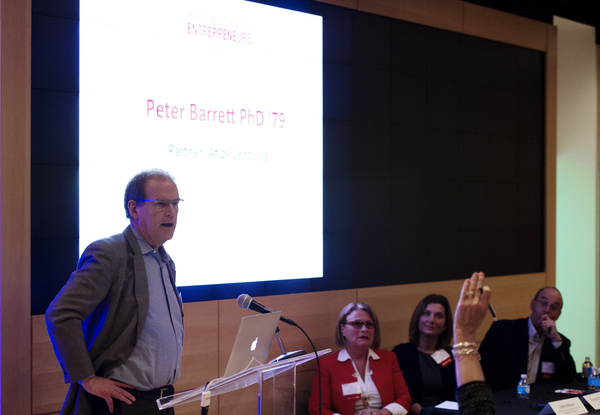Funding tips for startup ventures

Entrepreneurs and startup hopefuls looking to make an impact in the health sciences industry received funding tips from venture capitalists and angel investors in a panel discussion last week at Northeastern University.
The event, held Wednesday in West Village F, was hosted by the university’s Health Sciences Entrepreneurs program, an alumni group dedicated to fostering entrepreneurship in the rapidly evolving world of health care. The program was founded in 2005 by Joseph Fleming, PAH’70, MS’71, and a small group of entrepreneurs who wanted to teach students about entrepreneurship. It launched its mentor program in 2010; since then, about 30 companies have offered their expertise and guidance to Northeastern students, faculty, and alumni.
“We’ve attempted tonight to run the gambit on different kinds of financing,” Fleming noted in his introductory remarks. He added that he’s proud of the role the Health Sciences Entrepreneurs program plays in Northeastern’s entrepreneurial ecosystem. “There is a lot going on here,” he said.
In her opening remarks, Bouvé College of Health Sciences Dean Terry Fulmer noted that the event would feature a range of creative thinking and powerful advice on how startups can identify and connect with viable investors.
The panelists, for their part, delivered on that promise. They comprised Tracey Dodenhoff, founding director of Northeastern’s Center for Research Innovation; Jane Mason, vice president of the Cambridge Trust Company’s innovation banking group; Ben Littauer, an active angel investor; and Peter Barrett, PhD’79, a partner at the early-stage venture capital firm Atlas Ventures. Barrett received his doctorate in chemistry from Northeastern, and he is vice chair of the Barnett Institute of Chemical and Biological Analysis Advisory Board.
The panelists’ presentations highlighted the kinds of investment opportunities entrepreneurs in different stages of the development process should seek; the difference between funding from angel investors and venture capitalists; and the support the Center for Research Innovation can offer Northeastern ventures.
A common theme echoed throughout the evening was that budding entrepreneurs to do their homework on the market they’re entering and make sure their product or service meets a need. “Thinking creatively about the market is really important,” Dodenhoff said. “When you look under the radar screen, you may find things that may keep you from going to the market in the direction you are talking about. But you also may find some allies.”
In her presentation, Dodenhoff offered a variety of tips for searching for financing and development. She said it’s important that ventures think hard about their business model and that CRI has a range of services to help them connect with investors, large corporations, and potential business partners.
Northeastern offers a range of programs and resources that together serve as ecosystem that fosters the entrepreneurial spirit of its students, faculty, and alumni and offers assistance through a number of different organizations, including the Center for Research Innovation, the Center for Entrepreneurship Education, and IDEA, the student-led venture accelerator.
During the Q-and-A following the presentations, Littauer and Barrett were asked what their opinions are on “the lean startup” method proposed by entrepreneur and New York Times bestselling author Eric Ries in 2011. Ries believes if startups focus on iterative product releases to meet the needs of early customers, then they can reduce market risk and the need for outside capital.
Even though they represent different investing opportunities, Littauer and Barrett agreed it can only benefit entrepreneurs down the road if they get their business development moving with limited outside help. “Lean startup methodology is critical to your success in today’s world,” Littauer said.
“It keeps your capital needs way down.” “If it’s just about money, go for the cheapest source of capital you need to prove your hypothesis,” Barrett added. “Because then you may be able to raise money at a higher price later and not give away a certain percentage of your company.”
To find out about the Health Sciences Entrepreneurs program, or to apply as a venture or mentor, please visit www.neu.edu/hse or email j.norton@neu.edu.





